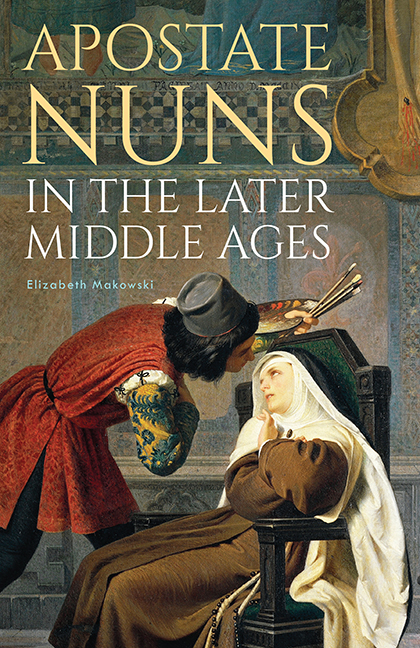Book contents
- Frontmatter
- Contents
- Preface
- Acknowledgements
- List of Abbreviations
- Introduction
- Part I The Vowed Life
- Part II Casting Off the Habit of Religion
- 2 Force and Fear
- 3 Land, Lust, and Love
- 4 Diversions and Disasters
- Part III Prodigals Return
- Conclusion
- Bibliography
- Index
- Other volumes in Studies in the History of Medieval Religion
4 - Diversions and Disasters
from Part II - Casting Off the Habit of Religion
Published online by Cambridge University Press: 18 September 2019
- Frontmatter
- Contents
- Preface
- Acknowledgements
- List of Abbreviations
- Introduction
- Part I The Vowed Life
- Part II Casting Off the Habit of Religion
- 2 Force and Fear
- 3 Land, Lust, and Love
- 4 Diversions and Disasters
- Part III Prodigals Return
- Conclusion
- Bibliography
- Index
- Other volumes in Studies in the History of Medieval Religion
Summary
Nuns are people too, and like people everywhere they need to take the occasional break from routine; when they do, they enjoy some of the same pleasures and pastimes as the rest of us. When medieval nuns selected their diversions, they too chose from the common store, which in their case consisted of universal restoratives like visits with family and friends, as well as those of a more peculiarly medieval stamp, like pilgrimages. Whatever their character, these respites from religious routine supplied an essential component of a balanced life and injected the stimulus of variety into communal regularity. For a few nuns however, diversions became substitutes for that regularity, and so for the vowed life.
Any enjoyment, even of an elevated sort, might become something more than an innocuous interlude. Few stories can rival the one from an era outside of our purview: that of Sister Christina Cavazza, the seventeenth-century Bolognese nun who, disguised as an abbot, left her monastery on three separate occasions (she was apprehended on her fourth attempt) in order to attend the opera. But music, or at the very least the musician, does seem to have been a deciding factor in the choices made by a fifteenth-century Benedictine nun from the priory of St. Michael's, Stamford, Agnes Butler.
When Bishop Alnwick visited the house in October of 1440, Prioress Dame Elizabeth Weldone deposed “that one Agnes, a nun of that place, has gone way in apostasy, cleaving to a harp-player; and that they dwell together, as it is said, in Newcastle-on-Tyne.” We learn a little further on in the detecta that this was not Agnes’ first unwarranted departure. The subprioress Dame Agnes Multone told the bishop that “sister Agnes, named Butylere or Pery or Northamptone, who is now an apostate, was led into apostasy at another time for a day and a night by brother John Harryes of the Augustinian order but that now she has been away for a year and a half.” The harp-player's appeal, initially perhaps only a lovely diversion from routine, seems to have been more lasting – Agnes had returned from her tryst with Friar John after just one night – but Bishop Alnwick was nevertheless dutybound to try to stop the music they were making together.
- Type
- Chapter
- Information
- Apostate Nuns in the Later Middle Ages , pp. 105 - 134Publisher: Boydell & BrewerPrint publication year: 2019



